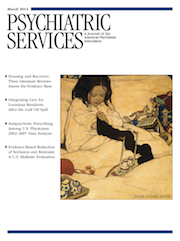Residential Treatment for Individuals With Substance Use Disorders: Assessing the Evidence
Abstract
Objective
Residential treatment is a commonly used direct intervention for individuals with substance use or co-occurring mental and substance use disorders who need structured care. Treatment occurs in nonhospital, licensed residential facilities. Models vary, but all provide safe housing and medical care in a 24-hour recovery environment. This article describes residential treatment and assesses the evidence base for this service.
Methods
Authors evaluated research reviews and individual studies from 1995 through 2012. They searched major databases: PubMed, PsycINFO, Applied Social Sciences Index and Abstracts, Sociological Abstracts, and Social Services Abstracts. They chose from three levels of evidence (high, moderate, and low) and described the evidence of service effectiveness.
Results
On the basis of eight reviews and 21 individual studies not included in prior reviews, the level of evidence for residential treatment for substance use disorders was rated as moderate. A number of randomized controlled trials were identified, but various methodological weaknesses in study designs—primarily the appropriateness of the samples and equivalence of comparison groups—decreased the level of evidence. Results for the effectiveness of residential treatment compared with other types of treatment for substance use disorders were mixed. Findings suggested either an improvement or no difference in treatment outcomes.
Conclusions
Residential treatment for substance use disorders shows value and merits ongoing consideration by policy makers for inclusion as a covered benefit in public and commercially funded plans. However, research with greater specificity and consistency is needed.




